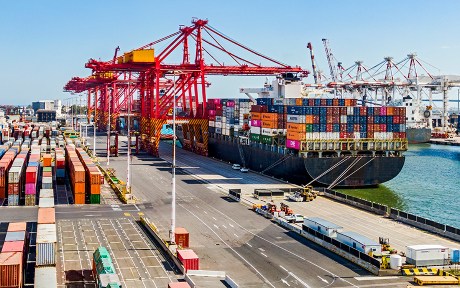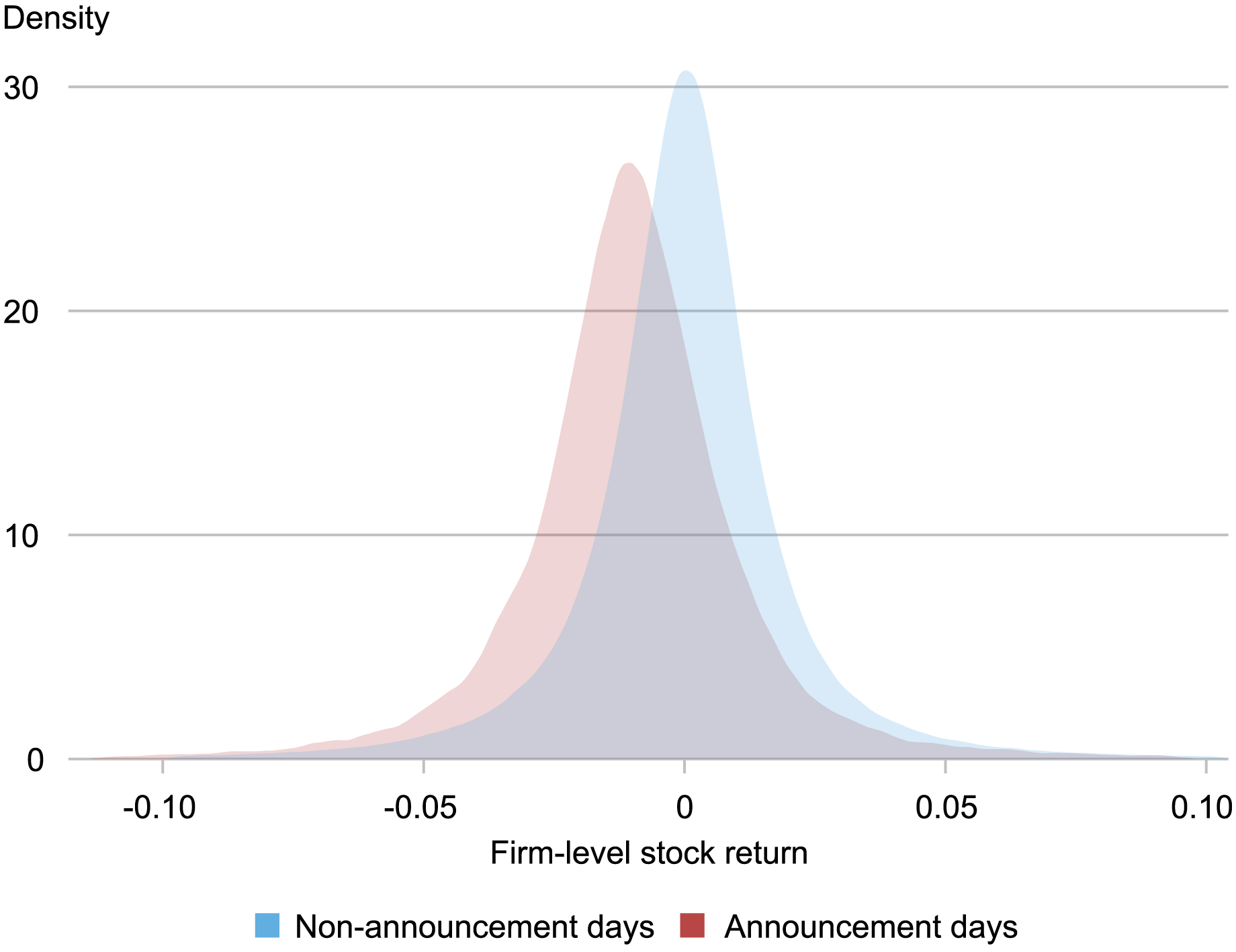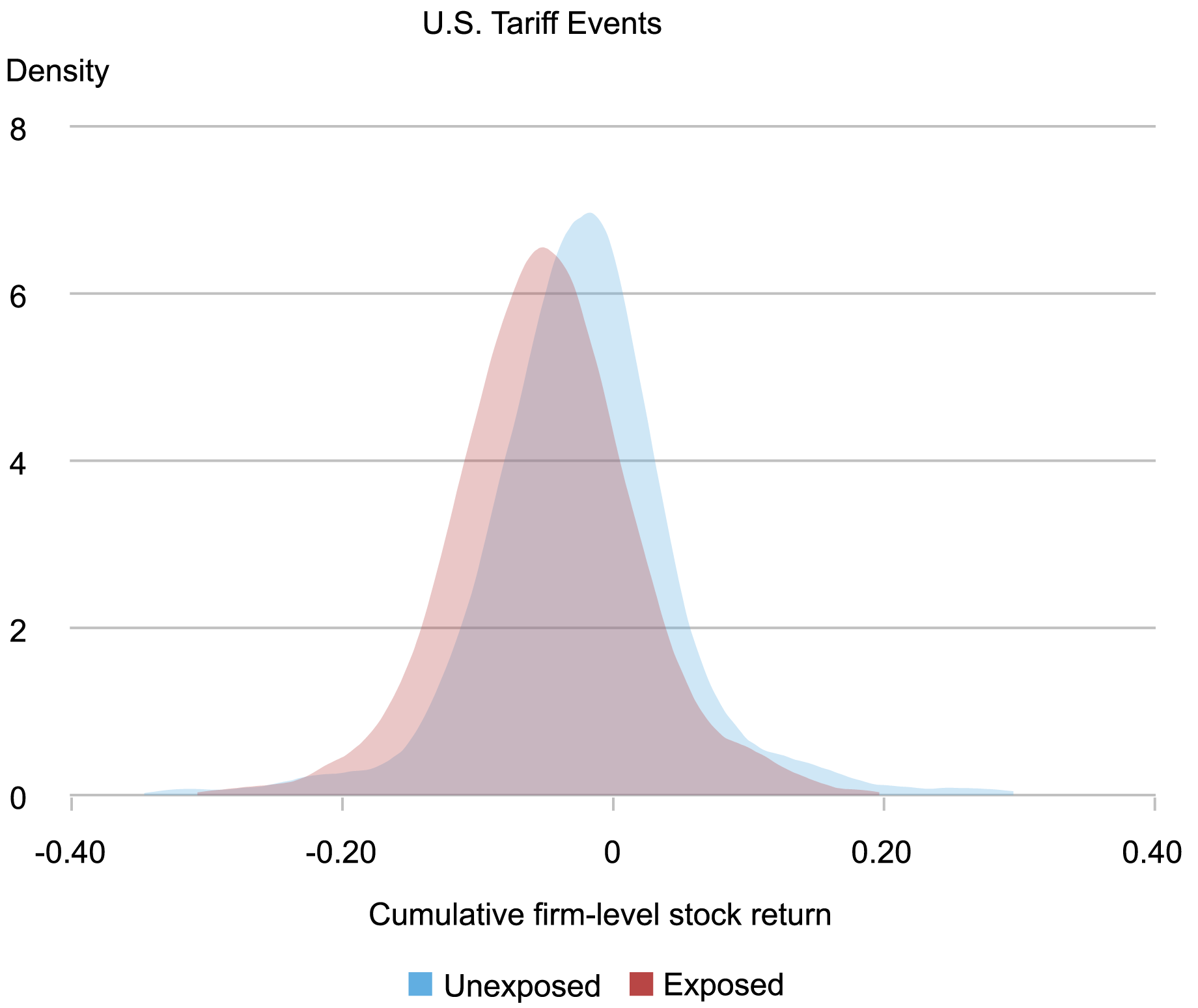
One key motivation for imposing tariffs on imported items is to guard U.S. companies from international competitors. By taxing imports, home costs develop into comparatively cheaper, and People change expenditure from international items to home items, thereby increasing the home trade. In a current Liberty Avenue Economics submit, we highlighted that our current examine discovered massive mixture losses to the U.S. from the U.S.-China commerce conflict. Right here, we delve into the cross-sectional patterns seeking segments of the economic system that will have benefited from import safety. What we discover, as a substitute, is that almost all companies suffered massive valuation losses on tariff-announcement days. We additionally doc that these monetary losses translated into future reductions in income, employment, gross sales, and labor productiveness.
Why Tariffs Would possibly Damage U.S. Companies
In the course of the 2018-19 U.S.-China commerce conflict, the U.S. levied 10 to 50 % import tariffs on greater than $300 billion of imports from China (and another nations). To grasp why tariffs could cause the home trade to shrink, we have to distinguish between tariffs on inputs and outputs. The main focus is often on trade output tariffs; for instance, increased tariffs on automobiles can defend the home automotive trade as a result of the upper tariff-inclusive worth of imported automobiles makes shoppers change to home automobiles. However, U.S. import tariffs have been largely levied on trade inputs, for instance, metal. Enter tariffs elevate the price of producing remaining items like automobiles within the U.S., making home manufacturing much less aggressive. Nevertheless, international companies don’t must pay for these tariffs when producing of their markets. In consequence, increased enter tariffs make it troublesome for U.S. producers to compete with international companies exporting to the U.S. market or in U.S. export markets.
Whether or not U.S. companies profit from import safety relies upon on the web impact, that’s, the “efficient charge of safety.” The truth that U.S. tariffs affected trade inputs extra broadly than outputs foreshadows our discovering that almost all U.S. companies suffered on web. As well as, the U.S. import tariffs imposed in the course of the commerce conflict resulted in retaliation from China with excessive tariffs on U.S. exports, making U.S. exports much less aggressive in China, resulting in losses of their export gross sales income.
Which Companies Had Worse Inventory-Market Returns on Tariff-Announcement Days?
Our method is to look at the stock-market returns of all publicly listed companies within the U.S. on the times of any main tariff bulletins throughout 2018-19. That is significant as we present in our paper that the stock-price actions from these announcement dates are tightly linked with future actions in money circulate.
Within the chart beneath, we plot your complete distribution of publicly listed U.S. companies’ inventory returns on days when no tariff bulletins have been made (in blue) and on days when tariffs have been introduced (in crimson). The chart reveals that your complete distribution of agency inventory returns is shifted to the left, that means that the tariffs’ announcement tended to decrease U.S. fairness costs.
The Detrimental Affect of the Tariff Bulletins on Inventory Returns Was Broad

Observe: The pattern includes every day inventory returns for all publicly listed companies from 2018 to 2019.
Many of the tariffs that have been introduced have been focused at imports from China. Due to this fact, we anticipate companies which are uncovered to China to expertise the biggest losses. A agency that was immediately uncovered to China via importing from China or promoting in China (both by exporting or by promoting via a subsidiary) had worse stock-market efficiency than those who weren’t immediately uncovered. For the reason that information reveal that half of U.S. listed companies are uncovered to China via one in every of these mechanisms, the commerce conflict immediately affected lots of America’s largest companies.
The chart beneath plots the distribution of one-day stock-market returns for unexposed companies in blue and for uncovered companies in crimson. As anticipated, uncovered companies skilled comparatively bigger losses than unexposed companies on the times of tariff bulletins, as proven within the chart with the distribution of returns for uncovered companies to the left of the unexposed. Apparently, and maybe surprisingly, the distribution of the unexposed companies additionally shifted to the left.
Distribution of Inventory-Market Returns of Uncovered Companies Is to the Left of Unexposed Companies

We have been additionally thinking about understanding whether or not these actions in agency inventory returns precisely mirrored predictions of companies’ future efficiency. Utilizing annual information for 2013 to 2021, we appeared on the correlation between stock-price actions on tariff-announcement days throughout 2018-19 and actual future outcomes for 2019 to 2021. We discovered that companies with decrease inventory returns round announcement dates skilled decrease income, employment, gross sales, and labor productiveness.
Companies with Worse Inventory-Market Returns Had Worse Future Actual Outcomes
| Impact of a one-standard-deviation fall (=0.56%) in stock-market returns on: |
P.c |
|---|---|
| Earnings | -12.9 |
| Employment | -3.9 |
| Gross sales | -6.7 |
| Labor productiveness | -2.2 |
We discover {that a} fall in a agency’s inventory costs on tariff-announcement days is related to a big decline in agency efficiency between 2019 and 2021. Specifically, a one-standard-deviation fall in a agency’s inventory costs (a 0.56 % fall in market worth) is related to a fall of 12.9 % in income, 3.9 % in employment, 6.7 % in gross sales, and a couple of.2 % in productiveness.
In sum, extracting positive aspects from imposing tariffs is troublesome as a result of international provide chains are complicated and international nations retaliate. Utilizing stock-market returns on commerce conflict announcement days, our outcomes present that companies skilled massive losses in anticipated money flows and actual outcomes. These losses have been broad-based, with companies uncovered to China experiencing the biggest losses.

Mary Amiti is the top of Labor and Product Market Research within the Federal Reserve Financial institution of New York’s Analysis and Statistics Group.
Matthieu Gomez is an affiliate professor of economics at Columbia College.
Sang Hoon Kong is an economics PhD scholar at Columbia College.
David E. Weinstein is the Carl S. Shoup Professor of the Japanese Economic system at Columbia College.
The way to cite this submit:
Mary Amiti, Matthieu Gomez, Sang Hoon Kong, and David E. Weinstein, “Do Import Tariffs Defend U.S. Companies?,” Federal Reserve Financial institution of New York Liberty Avenue Economics, December 5, 2024, https://libertystreeteconomics.newyorkfed.org/2024/12/do-import-tariffs-protect-u-s-firms/.
Disclaimer
The views expressed on this submit are these of the writer(s) and don’t essentially mirror the place of the Federal Reserve Financial institution of New York or the Federal Reserve System. Any errors or omissions are the duty of the writer(s).